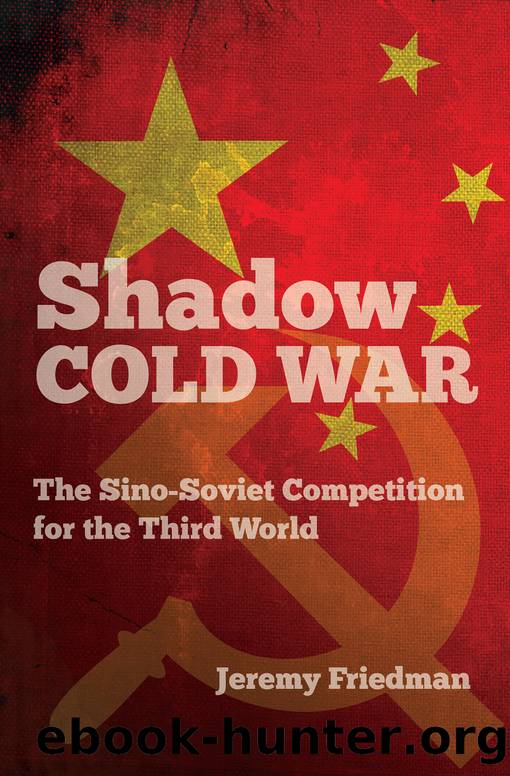Shadow Cold War by Jeremy Friedman

Author:Jeremy Friedman
Language: eng
Format: epub
Publisher: The University of North Carolina Press
The Demise of the Second Bandung Conference
Throughout 1965, thanks to the concerted efforts of the Kremlin,217 the decision that the PRC had successfully fought for in Jakarta in April 1964 to hold a second Afro-Asian heads of state conference without the USSR disintegrated. Under the twin pressures of diplomacy and aid, one country after anotherâIndia, UAR, Ghana, Cyprus, Iraq, Laos, Senegal, Nigeria, and the list goes onâcame out in favor of Soviet participation in the conference. Gromyko and Suslov maintained a constant correspondence on the issue in the summer of 1965, ticking new countries off their shopping list while Beijing watched countries slip through its fingers.218 When Ben Bella sent out the official invitations for the conference in late May to begin on June 29, the question of Soviet attendance was very much up in the air, and Gromyko told Suslov that the question might be decided only days before the opening.219 By June 29, of course, Ben Bella was no longer in power and, on June 27, in the conference hall in Algiers, the Soviet-backed proposal to postpone the conference carried the day against the wishes of Beijing and Boumedienne. While Beijing pushed for a new preparatory meeting to be held in November, it became clear that the USSR now had majority support for its attendance, and suddenly it was the USSR and India pushing to hold the conference. The PRC promptly declared that it would not attend and tried to scuttle the meeting. On October 28, 1965, Gromyko sent a lengthy proposed directive for the Soviet delegation at the conference to Suslov, Andropov, Ponomarev, Semichastnyi, and Shevliagin for consultation. The proposal outlined a Soviet approach and agenda to the conference in the event that the PRC chose to attend as well as if it did not.220 This time, though, Beijing succeeded, and the conference was never held.
By the end of 1965, the PRCâs foreign policy, such as it was, had collapsed. The Indonesian coup had eliminated its most important ally and the failure to hold a second Bandung Conference ended its hopes of creating an Afro-Asian bloc to bolster its self-professed status as the leader of the world revolution. This meant the failure, at least for the time being, of the attempt to compete head to head with the Soviet Union. Nevertheless, China had succeeded in changing the nature of the debate within the âsocialist campâ and possibly the world at large regarding the issues of imperialism, colonialism, and neocolonialism as well as aid and development, forcing the USSR to adapt its own policies in these areas in order to maintain its global status.
The question is: what accounts for this relative Soviet success? Many commentators have argued that the preponderance of Soviet resources relative to those of the PRC that could be distributed in the form of aid, especially the higher technological development of the USSR, led countries, when forced to choose between Moscow and Beijing, to choose Moscow. Certainly the USSRâs aid totals in these years far
Download
This site does not store any files on its server. We only index and link to content provided by other sites. Please contact the content providers to delete copyright contents if any and email us, we'll remove relevant links or contents immediately.
The Sympathizer by Viet Thanh Nguyen(4385)
The Rape of Nanking by Iris Chang(4203)
World without end by Ken Follett(3474)
Ants Among Elephants by Sujatha Gidla(3463)
Blood and Sand by Alex Von Tunzelmann(3195)
Japanese Design by Patricia J. Graham(3167)
The Queen of Nothing by Holly Black(2587)
City of Djinns: a year in Delhi by William Dalrymple(2554)
Foreign Devils on the Silk Road: The Search for the Lost Treasures of Central Asia by Peter Hopkirk(2463)
India's Ancient Past by R.S. Sharma(2451)
Inglorious Empire by Shashi Tharoor(2437)
Tokyo by Rob Goss(2427)
In Order to Live: A North Korean Girl's Journey to Freedom by Yeonmi Park(2385)
Tokyo Geek's Guide: Manga, Anime, Gaming, Cosplay, Toys, Idols & More - The Ultimate Guide to Japan's Otaku Culture by Simone Gianni(2364)
India's biggest cover-up by Dhar Anuj(2350)
The Great Game: On Secret Service in High Asia by Peter Hopkirk(2343)
Goodbye Madame Butterfly(2250)
Batik by Rudolf Smend(2179)
Living Silence in Burma by Christina Fink(2068)
